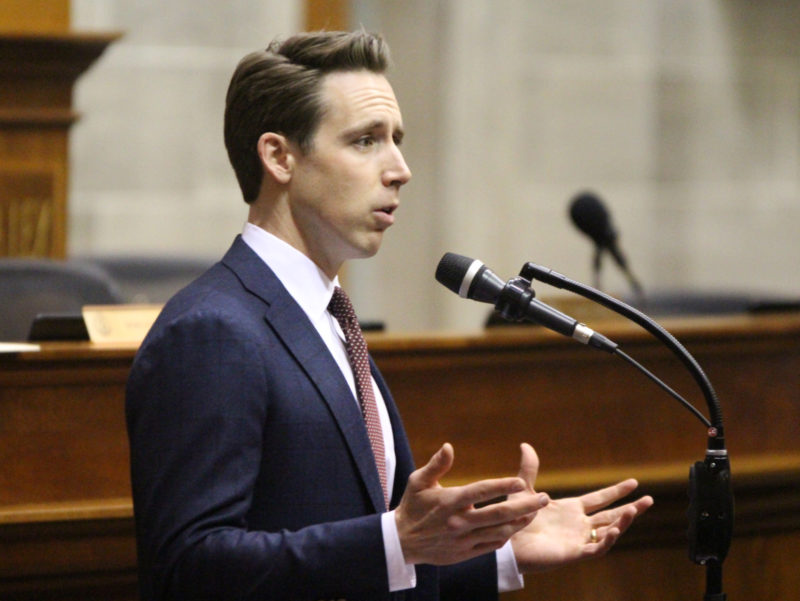In an opinion-editorial, U.S. Senate candidate Josh Hawley lambasted opponent-Sen. Claire McCaskill for stagnant wages, a loss of jobs, and trade deals not benefiting the United States.
Published in the Kansas City Star on Sunday, the op-ed went on to outline some of his priorities should he be elected, which included vocational training for high schoolers and tighten eligibility requirements for welfare programs.
Read the op-ed below:
A new way to give hardworking Missourians what they deserve
Growing up, if there was one thing my family valued above just about everything, it was hard work. I learned it on my grandpa’s farm, cutting weeds and changing gates in his fields in the summer. I saw it modeled by my parents, who never missed a day of work that I can recall. And I’ve witnessed it all over our state, in the men and women who rise before dawn to head to the job site or out to the field. Hard work is a way of life for most Missourians.
But for too long now, our economy hasn’t rewarded work like it should. And it hasn’t rewarded workers. Instead, the government has paid people not to work and has left working families to fend for themselves.
You can thank the Washington politicians for that, beginning with Sen. Claire McCaskill. McCaskill has spent 36 long years in politics, the last 12 in Washington, and what does she have to show for it? Jobs lost overseas. Working wages flat. Trade deals that benefit our competitors at the cost of our own people. Meanwhile, she’s gotten rich off taxpayer money, raking in more than $130 million in government subsidies for her family business. Now she’s one of the richest members of Congress. Shocking — but so typical of Washington.
Call me old-fashioned, but I believe Missouri deserves a senator who will put workers and working families ahead of self-advancement, someone who will fight for an economy where working people get the respect and reward they deserve. To get there, we’ve got to start thinking differently.
Start by putting workers first in our trade policy. For decades now, working wages have been held flat by unfair deals that encourage taking jobs from Americans and giving them to cheap labor overseas. We need deals that prioritize the skills and effort of American workers. President Donald Trump’s recent trade agreement with Mexico is a good start.
We also need to invest in our workers, in their skills and education. Four-year colleges have had a monopoly on public dollars for too long, even as they charge more and turn out increasingly worthless degrees. It’s time to allow workers to use federal student loan money for apprenticeship programs and job-training courses. Break up the college monopoly. It shouldn’t be that you have to get an expensive four-year degree to get a job — or respect — in this country.
We need to put vocational training back into high schools. As part of that effort, we should explore partnerships with private employers that would offer a high school junior or senior the chance to take classes in the morning and learn a skill in the afternoon, with the goal of graduating ready for a job.
And we need to start rewarding work rather than welfare. The federal government spends billions every year on various and duplicative programs that pay people not to work. That money can be put to better use. We should consolidate those programs and tighten eligibility requirements so that money flows only to those truly in need. And we should use the savings to invest directly in our workers.
I support a wage increase for every American worker who makes below the median wage. Call it a work credit. If you make less than the median wage, this credit would boost your per-hour wage to bring it 50 percent closer to the median. And the credit would come to you in every paycheck.
We already have something like this in the form of the EITC — the Earned Income Tax Credit. But the EITC is too complicated, too hard to administer and too prone to abuse. We should overhaul the EITC and convert it into a true work credit, to be delivered through the payroll tax system to every American who works a steady job. American workers deserve a return on the work they do that reflects its true value to our country. And they deserve support against the cheap labor and anti-competitive practices of other countries overseas.
Washington has given us an economy that works brilliantly for earners at the top, but provides fewer and fewer opportunities for everyone else. While people like McCaskill get rich, working people watch their futures fade away. We can do better than that. And we can start by sending someone to Washington who hasn’t been part of their bickering and failure, someone ready to lead a new fight for Missouri workers.












